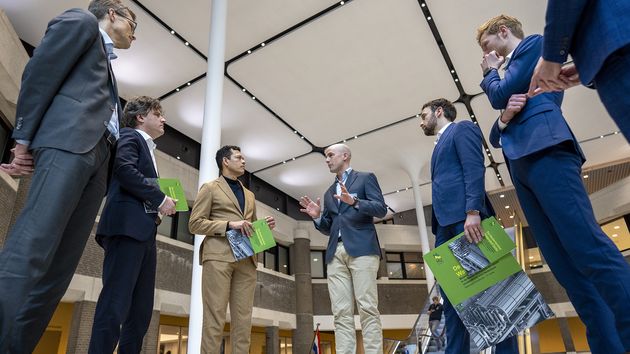The Netherlands – De Nederlandse Waterstof Delta (The Dutch Hydrogen Delta) has presented a strategy to MPs Bontenbal (CDA), Boucke (D66), and Erkens (VVD) to jump-start the electrolyser manufacturing industry and so speed up the hydrogen economy.
Twelve consortium partners created the De Nederlandse Waterstof Delta plan, and 80 million euros have been requested from the National Growth Fund for its implementation.
The strategy makes sure that the Netherlands gains more independence and begins building the green hydrogen production facilities it needs. From 2026, one gigawatt of plants will be supplied annually by the Nederlandse Waterstof Delta. By doing so, it can provide the Netherlands with half of the plants it needs to satisfy its interim climate goals by 2030.
Battolyser
The Battolyser, a distinctive hydrogen battery developed by the Dutch, serves as the foundation for the plants. By using renewable electricity, this TU Delft-developed system can store electricity and create green hydrogen. When there is an abundance of wind and solar energy, the system can manufacture hydrogen, and when there is a lack of wind and solar energy, it can feed the grid with electricity.
By 2026, De Nederlandse Waterstof Delta hopes to have a 1 GW annual Battolyser production capacity in the Merwe-Vierhaven region (M4H). The industrial sector, according to the Port of Rotterdam Authority, is the weak link in the Dutch hydrogen economy. For instance, the Maasvlakte is being developed with factories that produce green hydrogen. The accompanying machinery, however, is not now produced in the Netherlands.
Application
Application for Growth Fund Subsidy will also be used for supplier scaling up and supplier research for a broad manufacturing industry. Also, funds will be invested in the so-called H2 Innovation Hub, a place where businesses, start-ups, scale-ups, investors, researchers, and the government may come together to exchange knowledge and form alliances. This new cluster in the Merwe-Vierhaven region will also include technical courses.
Strategy
The strategy was presented to three MPs who have been pushing for the necessity of advancing the hydrogen economy, with a focus on the manufacturing sector required to fulfill the objectives. The strategy, in particular the production facility, will create lucrative jobs. Also, it will increase the economy’s viability and boost the Netherlands’ purchasing power. Additionally, it guarantees that the Netherlands will have the resources necessary to fulfill its climate aspirations. This will prevent Europe and the Netherlands from once again relying on technology from nations like China and Russia to strengthen their economies.
As was done with the RDM site, this development is a component of a larger renovation of the M4H area by the Port of Rotterdam Authority and the municipality. The overarching goal of these changes is to make the Rotterdam Makers District a thriving hub for sustainable manufacturing.
Members
Battolyser Systems, the Port of Rotterdam Authority, Platform Zero, Didak, Agfa Gevaert, Madern International, VSPARTICLE, Demcon, the Delft University of Technology, Techniek College Rotterdam, the Hogeschool Rotterdam, and InnovationQuarter make up the De Nederlandse Waterstof Delta collaboration. The consortium members work together to develop and produce the essential parts for the electrolyser, assemble them at scale, realize an ecosystem with the required facilities, and provide skilled labor.





